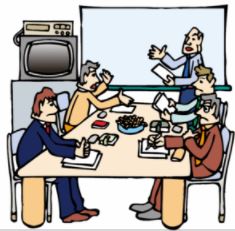Japanese-style Debate
CONTENTS
Japanese-style Debate and Discussion
By P. Pringle
An All-too-common Situation in a Japanese Company
Have you been in a meeting like this? The Japanese and Americans working at a Japanese multinational company are having a meeting to discuss an issue. Both sides agree to brainstorm the topic. The Japanese start asking questions. The Americans start developing their arguments, in other words, they start debating. “That will never work,” says Joe. “Yes, it will,” says Bob, “and here’s the data to back it up.” “That data’s no good,” says Joe, “You obviously didn’t check the latest report. You are wrong.” Bob defends himself, “No, you’re wrong. That report was studying the wrong thing.” The Japanese go silent and stop asking questions. Another meeting is scheduled for the same topic. Later, Joe asks himself, “I wonder why they called it quit just when the discussion was getting somewhere?”
Brainstorming and Debate in the US

Americans see brainstorming and debate as a good way to bring out the best ideas. It is efficient way to get everyone in the same room and “hash things out,” “toss ideas around,” and “put everything on the table” to get to a decision. Americans don’t mind a little conflict, since it is “just business.”
Our Western custom of debate stretches way back to the Greek philosopher Protagoras in the 4th century. Debate has been taught to educated people for centuries. No wonder our method of determining goods and bads and rights and wrongs is so black and white! Skill in debating is a necessary qualification for management in American business. The motive of a debate is to win. Managers are winners. Their talent is to “sell it, don’t tell it.”
However, what seems like a great discussion to an American may seem like an argument to the Japanese.
Debate or Discussion in a Japanese Company
The Japanese are not taught debate in schools, although they are aware it exists. Through contact with Westerners, Japanese society has been introduced to debate in a number of different historical time periods. In 1874, Yukichi Fukuzawa, the most influential thinker of the Meiji Period (1868-1912) (to give you some idea of his importance, he appears on the Japanese 10,000 yen (approximately $120 US dollar) banknote) strongly advocated the merits of debate in education. But nowadays debates are mostly taught in an English class as its activity in high school and college English Speaking Societies. Therefore most Japanese think of debate as something foreign and technical. It is not a way to make decisions.
How Do Japanese Discuss Issues?

If Japanese do not debate, how do they discuss issues or make decisions? Isn’t healthy conflict needed to come to the best decision? Not so common for the Japanese. To avoid conflict the Japanese start with shared goals and they tend to look for areas of agreement first. They sometimes argue and oppose, but rather new ideas are introduced to add to or complement the previous ideas. They rely on data objectively and not so much on persuasive arguments. There is little telling or selling. A Japanese manager is expected to listen to staff in order to gather the best ideas.
What Happens When the Arguments Get Lively in Japan?
Some Japanese, especially those with little experience working with non-Japanese, are not accustomed to conflict. Just when the Americans think that the brainstorming is really getting going, the Japanese shut down. The Japanese sense that the discussion has become “kanjoteki” (感情的, overly emotional). When this happens, the discussion might be stopped and over. Unfortunately, the Americans sometimes interpret the silence of the Japanese as conceding to their arguments. They think they have defeated the Japanese with their rational control of the data, but in fact the Japanese think they are getting too emotional! The Japanese may feel the need to reschedule the discussion when the Americans have calmed down.
How to Discuss Issues with the Japanese
Here are some ideas. The purpose is to minimize conflict and make it safe for everyone to share ideas and opinions, not just loud people.
- Make sure you have an agenda and stick to it.
- Preferably, work with the Japanese in advance to set up the agenda. They will want to prepare for the meeting and be ready to participate.
- Begin the meeting by outlining the shared goals and purpose of the discussion.
- Make sure that the discussion is not dominated by vocal or argumentative individuals.
You may wish to set up ground rules in advance for company discussion. This might include rules to reduce conflict, such as no interruptions or everyone gets a chance to speak.

As an individual, clarify for yourself in advance what you want to learn or share, and why. Focus on facts, and consider if they could be interpreted differently. You may want to be tentative when sharing. Instead of saying, “You don’t know X,” you could say, “I have some information I would like to share with you.” Instead of saying, “You are wrong about Y,” you could say, “That is a different take on Y, could you tell me more?” Instead of asking, “What do you have to say about this?” you could ask, “Do you have any advice on this topic that you could share?” Listen to the response, ask follow-up questions, and summarize. This shows that you are listening and trying to understand their point of view.
Look for signs of discomfort or disagreement. Are the Americans making personal attacks (“You are wrong!”)? A time out might be helpful. Likewise if the Japanese become quiet, this might be time to regroup and return to the mutual goals.
Why Go to the Trouble? You may ask, “Why should meetings be safe? Shouldn’t we all have thick skins? After all, we are all adults here.” The truth is that more gets done when we aren’t constantly butting our heads in meetings. This is especially true when working with the Japanese.


